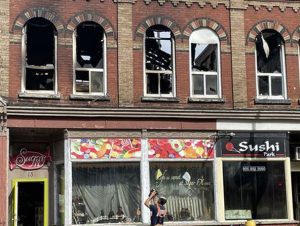
Monday night’s candidates’ forum was drawing to a close. The next to last questioner in the Q&A portion of the forum at the Uxbridge arena had to stand on a chair to reach the microphone, but her dad helped her get there. It was probably long past her bedtime, but Bella McKenzie-Pugsley collected her thoughts and spoke clearly but with concern.
“Why are there so many fires?” she asked the candidates seated across the south wall of the hall. “Our firefighters are great people. They are our heroes.”
The fire that frightened nine-year-old Bella, broke out last Wednesday night (Sept. 21) and in a matter of hours gutted 11/13 Brock Street East. The flames destroyed Cheryl Hinzel’s street-level candy/gift shop, the Sushi Park restaurant next door and the apartments above. Uxbridge firefighters responded to the fire call about 1 a.m. Thursday, ensured no one was trapped inside the building, and battled the blaze much of the night and into the next day.
I learned later that the addition of an aerial unit dispatched from the Whitchurch-Stouffville Fire and Emergency Services helped extinguish the fire and likely saved the rest of the block from destruction.
“We owe a lot to the Stouffville crews and their aerial unit,” Bruce Garrod explained at the candidates’ forum. “Uxbridge Fire Department will very shortly take delivery of a similar unit. It will make a big difference.”
True enough. But I have to admire any woman or man with the mental fortitude to race headlong to the scene of a fire and (with little more than moments to assess) race into a blaze in search of victims. It’s ingrained training and practised response that drives them. But it’s something more that shuts out fear or flight reflex and puts them in harm’s way to save others.
Several years ago, I interviewed Alannah Gilmore, a military medic who served with Canadian Forces’ operations during the war in Afghanistan. Trained to deal with massive casualties, in 2006 M/Cpl Gilmore responded to numerous “mass cals” calls.
“I didn’t have to think about it,” she told me. “I just calmed right down and did what I’m trained to do. It’s all muscle memory.”
Five years later, as a civilian back home in Ottawa, Gilmore and her (then) husband came across a five-car collision in Orleans, Ont., where a car had T-boned a van. A police officer was on the scene, but had his hands full directing traffic. Gilmore said, “It’s go time!”
And her muscle memory took over. The impact of the collision had buckled a van door and pinned a young girl inside. The mother was hysterical. But Gilmore shut everything else out, crawled into the van next to the child and called for arriving paramedics to hand her life-saving equipment and oxygen.
“I was like, ‘Just hand it to me. I need this. I need that,’” ensuring a clear airway for the child to breathe. Gilmore had responded with the same authority and skill as she had on deployment in Afghanistan. Despite the medic’s every effort, however, the child died. She told me later her service in uniform and as a civilian made her PTSD patient.
In the middle of an intersection in Oshawa, 13 years ago, the driver of a pickup truck ran a red light (police later determined she was on her cell phone) and T-boned my car at the front-seat passenger’s side. If my wife had been with me, she’d most likely have been killed. The passenger door was crushed in far enough that it cut the right side of my head.
I remember the world spinning for what seemed minutes (it was probably seconds). My car catapulted through the intersection, wiped out a signal light standard, and stopped right-side-up but facing the opposite direction. My seatbelt saved me from serious injury, but I had blood streaming across my face. The first thing I remember focusing on was the face of a paramedic.
“Can you move your arms?” he asked me. I nodded. He dabbed the cut on my head with gauze and comforted me, “Don’t worry. We’ll have you out of here in a minute.” I don’t remember much else from that crash, except the paramedic’s reassuring, “Don’t worry.”
Much the way firefighters became young Bella’s instant heroes during the recent downtown fire in Uxbridge, after my near-death collision in Oshawa in 2009, those paramedics became mine. When I later thanked them in the hospital, predictably one of them said, “No worries. That’s what we’re here for.”
Calmness under fire may be part of their job description, but their skill and courage are also a community’s greatest asset in an emergency.